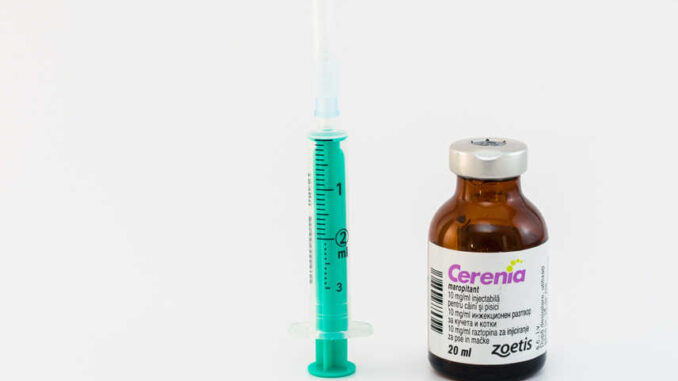
This article was updated on August 26th, 2023
Did your veterinarian just prescribe your dog Cerenia? As a veterinarian, this is a common medication that I prescribe to dog each day for vomiting, diarrhea, and GI pain. In this article, I will explain if Cerenia is safe for dogs, and what dosage your dog can have to avoid overdose risks. Naturally, you should always consult with your vet to determine the right amount as your vet knows your individual’s dog health profile.
What is Cerenia?
Cerenia is a medication that is used to treat nausea, vomiting and GI pain in dogs and cats. This can also be used at higher dosages to help with motion sickness when riding in the car. This medication can also be given to dog who experience nausea and vomiting after receiving chemotherapy.
Is Cerenia safe for all dogs?
Cerenia is a relatively safe medication for all dogs. This medication is processed by the liver so dogs with liver disease may not be prescribed Cerenia: other medications will be used to control their GI issues. Cerenia has also not been evaluated in puppies under 2 months of age, especially at higher dosages needed to control motion sickness.
If your dog is still vomiting even when taking Cerenia, they should be re-evaluated and GI obstruction or toxin exposure considered.
How much Cerenia can my dog have?
A typical dosage of Cerenia is 1mg per pound once a day. In rare cases, this medication can be given twice a day. This medication is often first given as an injection in your veterinary office followed by oral tablets for you to take at home. This medication can be given for 5 consecutive days. While it can sometimes be given for a longer period of time, there just have not been studies to prove that it is safe for your dog to take that long.
Can dogs overdose on Cerenia?
If your dog has overdosed on Cerenia, they will be stumbling around, vomiting, and having diarrhea. These can also indicate that there is something severely wrong going on with your dog. Most dogs who are vomiting even when taking Cerenia in my experience will have an obstruction or severe GI disease so vomiting while taking Cerenia does not always indicate an overdosage.
What dose is fatal to dogs?
While the fatal dosage is not known, a dosage of 20mg per kilogram of body weight can cause very serious heart, GI and electrolyte imbalances that can lead to death in your dog. Without the proper veterinary care and attention, many of these signs would be irreversible and cause lifelong health issues in your dog. View manufacturer dosage information (PDF).
If your dog is taking Cerenia, it is best to continue to monitor them for any other GI issues as this can indicate that your dog has taken too much Cerenia but can also indicate severe GI disease and your dog needs to go back to the vet for more testing to figure out why they are sick. Delaying any vomiting and GI issues can cause severe and sometimes life-threatening issues.
Other FAQs about Cerenia and Dogs
Is a 4mg/pound dose of Cerenia safe for dogs?
If your dog was prescribed a very high dosage this is usually very safe. Most dogs will take a 4mg per pound dosage for car and motion sickness. These high dosages are often only prescribed for your dog on an as-needed basis and should not be given at that high of a dosage all the time. If your dog needs daily medications for motion sickness, talk to your vet about other medications that they can take.
What are the side effects?
If your dog has received too much Cerenia you will notice certain side effects such as:
- Diarrhea
- Drooling
- Lethargic
- Vomiting
- Not eating
- Muscle tremors
Some of these side effects can also indicate that there is something else seriously wrong with your dog. If your dog is displaying any of these side effects, it would be best to see your vet right away. They will want to start your dog on IV fluids to flush this medication out of their body. They may also want to run blood work or other test to make sure that there is not anything else wrong with your dog causing these issues.
Disclaimer: This website's content is not a substitute for veterinary care. Always consult with your veterinarian for healthcare decisions. Read More.


Be the first to comment